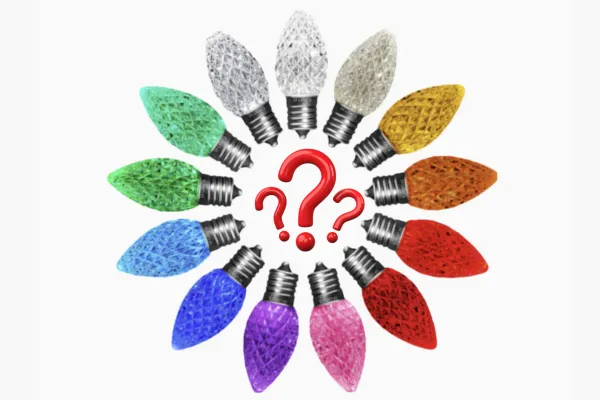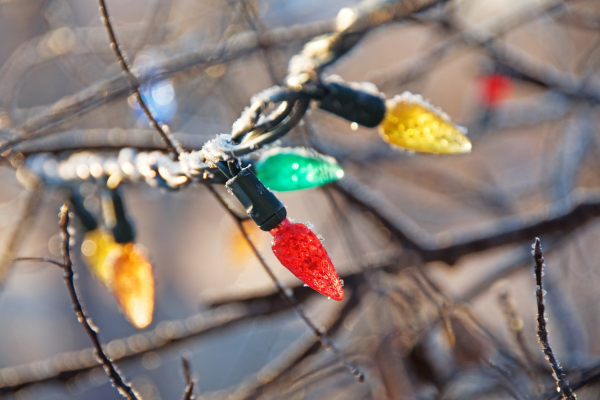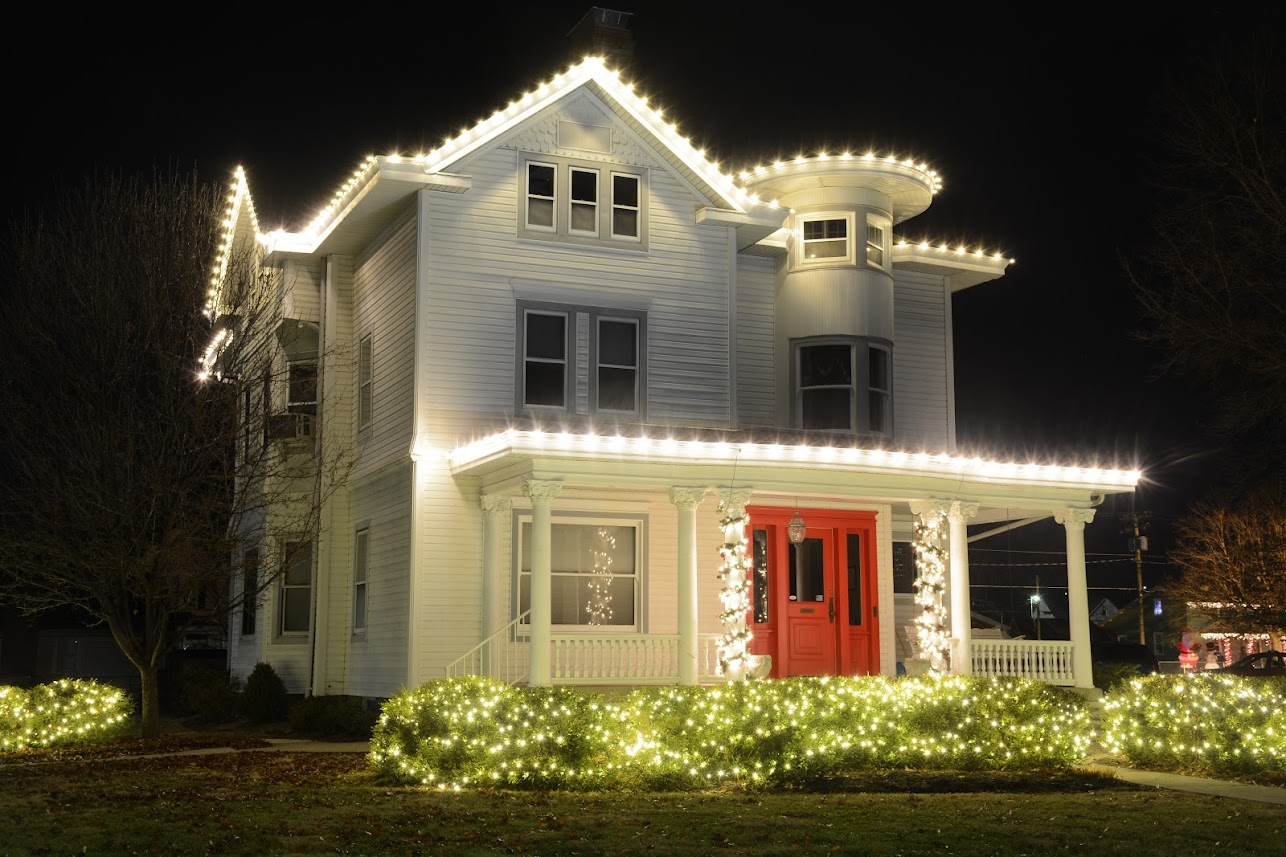Blog
Our Top Blog Posts

How long do LED string lights last?
As you string up your LED lights, reminiscent of a time when candles flickered on tree branches, you might ponder their lifespan. These modern marvels promise longevity, but it's not as simple as plugging them in and forgetting them.
The durability of LED string lights hinges on factors you can influence, from the make and model to maintenance rituals. Imagine enjoying the same set of lights for countless celebrations, their glow undimmed by time.
Before you drape another strand over your mantelpiece, let's explore how to maximize their life, ensuring they brighten many more chapters of your story.

LED String Lights Lifespan
How long do LED string lights actually last?
You might be surprised to learn that while the theoretical lifespan of an LED bulb ranges from 10,000 to 25,000+ hours, the real-world lifespan of LED Christmas light strings is typically 6 to 7 seasons. This discrepancy isn't due to a failure in technology but rather hinges on several key factors, including quality assurance, exposure to environmental factors, and adherence to electrical safety measures.
First off, quality assurance plays a pivotal role in the longevity of your LED string lights. High-quality lights, manufactured under strict durability standards, are designed to withstand numerous seasons. These lights are tested for energy efficiency and durability, ensuring they live up to their promised lifespan. When you're shopping for LED string lights, it's crucial to look for products that meet these high standards of quality assurance.
Environmental factors also significantly impact the lifespan of your lights. While LEDs are more energy-efficient and durable than traditional lighting options, they're still susceptible to damage from prolonged exposure to harsh weather conditions. However, LED lights engineered with robust casings can resist the wear and tear of environmental exposure, extending their functional life.
Lastly, electrical safety can't be overstressed. LED string lights that are built with surge protection and comply with electrical safety standards are less likely to suffer from electrical malfunctions, further prolonging their lifespan. It's essential to choose string lights that incorporate these safety features to ensure not just a longer life for your lights but also a safer environment for their use.
There are many reasons to choose LED Christmas lights besides their long life span. Read more about these benefits on our blog post Shining Bright: The Benefits of LED Christmas Lights.

Factors Affecting Longevity
Several factors can significantly impact the longevity of your LED string lights, from the quality of the product to its exposure to harsh environmental conditions. You'll find that exposure impact isn't just a buzzword; it's a real concern that can shorten the life of your lights. Prolonged exposure to sunlight, rain, and snow can degrade the materials, leading to quicker wear and tear. You've got to consider protective measures to shield them from the elements, ensuring they last as long as possible.
Usage duration plays a pivotal role too. The more you use your LED string lights, the faster they'll reach the end of their lifespan. It's crucial to strike a balance in how often you light them up. Quality importance can't be overstated either. Investing in high-quality LED lights might cost more upfront, but they're designed to withstand longer periods of use and harsher conditions.
Care routines also make a huge difference. Regularly checking your lights for any signs of damage, such as frayed wires or broken bulbs, and addressing these issues promptly can prevent further damage that might shorten their lifespan. Protective measures, like using a surge protector, can safeguard your lights against electrical surges that could fry the delicate LED components.
In essence, while LED string lights are touted for their longevity, ensuring they last requires a proactive approach. Paying attention to quality, limiting their exposure to damaging conditions, moderating their usage, and adhering to diligent care routines are all key to maximizing their lifespan.

Enhancing Lifespan Tips
To significantly extend the life of your LED string lights, start by investing in high-quality products and adopting proper care routines. High-quality lights adhere to superior quality standards, ensuring they're built to last longer and withstand more wear and tear than their cheaper counterparts. This initial step is crucial in ensuring you're not frequently replacing your lights, saving you money and hassle in the long run.
Next, consider the impact of weather protection. LED string lights are often exposed to harsh outdoor conditions, including rain, snow, and extreme temperatures. Protecting your lights from the elements can significantly reduce the risk of damage. Look for lights designed for outdoor use, featuring waterproof or water-resistant ratings. This will safeguard your lights against weather-related wear, extending their lifespan.
Your usage habits also play a significant role in the longevity of your LED string lights. Avoid leaving your lights on 24/7. Overuse can lead to premature burnout. Instead, turn them off when not needed or consider using a timer to manage their operation automatically. This approach not only prolongs the life of your lights but also conserves energy.
Storage and Maintenance
After exploring how to enhance the lifespan of your LED string lights, let's focus on the importance of proper storage and maintenance for ensuring their longevity.
Proper storage isn't just about keeping your lights out of the way when they're not in use; it's about preserving their quality and functionality for the next season. Wrap your lights carefully, avoiding tangles that can lead to damage, and store them in a cool, dry place. Hot attics or damp basements are a no-go, as extreme temperatures and moisture can degrade the lights over time.
Maintenance routines are equally crucial. Before you pack your lights away, take a moment for a quality check. Look for any signs of wear and tear, such as frayed wires or loose connections. Addressing these issues now can save you from a headache later. Additionally, employing surge protectors when your lights are in use can prevent power surges from shortening their lifespan. This simple step can make a significant difference in protecting your investment.
Lastly, consider timers usage to regulate how long your lights are on. This not only saves energy but also reduces the strain on the LEDs, potentially extending their life. Timers can ensure that your lights aren't left on longer than necessary, avoiding overuse.

Annual Inspection Guide
Before you deck the halls each season, it's crucial to perform an annual inspection of your LED string lights to ensure they're in top working condition. This maintenance checklist will guide you through identifying any potential issues, ensuring your lights shine bright throughout the festive period.
First up, safety precautions can't be overstated. Check each string for frayed wires or damaged bulbs, as these could pose fire hazards. If you spot any signs of wear and tear, refer to your troubleshooting guide to decide if a simple repair will suffice or if you're better off with replacement options.
When it comes to repair techniques, some issues like loose bulbs or minor wire exposure can often be fixed at home. However, remember that safety comes first. If you're unsure about how to proceed, it's better to replace the faulty string than risk an accident.
Speaking of replacement options, sometimes it's more cost-effective in the long run to invest in new LED strings. If your lights are nearing the end of their lifespan—typically 6 to 7 seasons for most quality LED lights—upgrading to a new set might be your best bet. This is also an excellent opportunity to upgrade to more energy-efficient models or change your design aesthetic.
Lastly, ensure your lights are connected to a surge protector during use. This simple step can significantly extend their lifespan by protecting them from voltage spikes.

Can the Color of LED String Lights Fade Over Time, and if So, What Causes This?
Certainly, the color of your LED string lights can fade over time. Factors like color stability, material degradation, UV exposure, and heat impact play pivotal roles. Sunlight and high temperatures can particularly cause colors to dull.
Additionally, manufacturing variances mean some lights might start fading sooner than others. To minimize this, consider lights with better quality and enhanced UV protection, and place them in areas less exposed to direct sunlight and high temperatures.
Are There Any Environmental or Health Considerations to Be Aware of When Disposing of LED String Lights?
When you're ready to dispose of your LED string lights, consider recycling options due to hazardous components they may contain.
Disposal laws vary, so check local regulations to minimize environmental impact and health risks.
Some parts of LED lights can be harmful if not handled properly. Recycling helps reduce those risks and supports a healthier planet.
Don't just toss them out—look into eco-friendly disposal methods to do your part!
How Does the Variation in Voltage Supply Affect the Lifespan of LED String Lights?
Variations in voltage supply can significantly impact your LED string lights' lifespan. Without proper voltage stability, power surges can damage the lights, shortening their life.
Using dimming functionality without ensuring electrical compatibility can also harm them.
To protect your lights and extend their lifespan, it's crucial to invest in surge protection. This way, you'll safeguard against unpredictable voltage fluctuations and ensure your LED string lights last as long as possible.
Can LED String Lights Be Repaired if a Section Stops Working, or Do They Need to Be Completely Replaced?
Yes, you can often repair LED string lights if a section stops working, instead of replacing them entirely. Mastering soldering techniques is key for reconnecting broken wires.
Knowing connector types helps you make precise fixes. Don't overlook wire gauge importance; it ensures your repairs handle the correct current.
Use troubleshooting tips to identify issues quickly. Finally, apply protective coatings to repairs to shield them from the elements, extending their lifespan.
What Are the Cost Implications of Switching From Traditional Incandescent String Lights to LED String Lights in Terms of Energy Consumption and Lifespan Savings?
Switching to LED string lights might seem like a leap into the unknown, but it's more like stepping into a brighter, more cost-effective future.
You'll face upfront costs, including the purchase price and retrofit challenges, but the lower installation costs, reduced maintenance frequency, and potential rebate programs sweeten the deal.
Plus, the energy consumption and lifespan savings quickly outshine initial expenses, making this switch not just smart, but brilliantly economical in the long run.

In wrapping up, your LED string lights are more than just seasonal sparklers; they're long-term companions in creating ambiance. Remember, their lifespan isn't set in stone but can be stretched with a little TLC.
From braving weather wars to dodging power surge bullets, taking care of them ensures they'll keep your nights brightly lit for years. Store them carefully, and let annual check-ups be your ritual.
Like fine wine, with age and care, your lights will only glow brighter, making every moment magical.

How long do LED string lights last?
As you string up your LED lights, reminiscent of a time when candles flickered on tree branches, you might ponder their lifespan. These modern marvels promise longevity, but it's not as simple as plugging them in and forgetting them.
The durability of LED string lights hinges on factors you can influence, from the make and model to maintenance rituals. Imagine enjoying the same set of lights for countless celebrations, their glow undimmed by time.
Before you drape another strand over your mantelpiece, let's explore how to maximize their life, ensuring they brighten many more chapters of your story.

LED String Lights Lifespan
How long do LED string lights actually last?
You might be surprised to learn that while the theoretical lifespan of an LED bulb ranges from 10,000 to 25,000+ hours, the real-world lifespan of LED Christmas light strings is typically 6 to 7 seasons. This discrepancy isn't due to a failure in technology but rather hinges on several key factors, including quality assurance, exposure to environmental factors, and adherence to electrical safety measures.
First off, quality assurance plays a pivotal role in the longevity of your LED string lights. High-quality lights, manufactured under strict durability standards, are designed to withstand numerous seasons. These lights are tested for energy efficiency and durability, ensuring they live up to their promised lifespan. When you're shopping for LED string lights, it's crucial to look for products that meet these high standards of quality assurance.
Environmental factors also significantly impact the lifespan of your lights. While LEDs are more energy-efficient and durable than traditional lighting options, they're still susceptible to damage from prolonged exposure to harsh weather conditions. However, LED lights engineered with robust casings can resist the wear and tear of environmental exposure, extending their functional life.
Lastly, electrical safety can't be overstressed. LED string lights that are built with surge protection and comply with electrical safety standards are less likely to suffer from electrical malfunctions, further prolonging their lifespan. It's essential to choose string lights that incorporate these safety features to ensure not just a longer life for your lights but also a safer environment for their use.
There are many reasons to choose LED Christmas lights besides their long life span. Read more about these benefits on our blog post Shining Bright: The Benefits of LED Christmas Lights.

Factors Affecting Longevity
Several factors can significantly impact the longevity of your LED string lights, from the quality of the product to its exposure to harsh environmental conditions. You'll find that exposure impact isn't just a buzzword; it's a real concern that can shorten the life of your lights. Prolonged exposure to sunlight, rain, and snow can degrade the materials, leading to quicker wear and tear. You've got to consider protective measures to shield them from the elements, ensuring they last as long as possible.
Usage duration plays a pivotal role too. The more you use your LED string lights, the faster they'll reach the end of their lifespan. It's crucial to strike a balance in how often you light them up. Quality importance can't be overstated either. Investing in high-quality LED lights might cost more upfront, but they're designed to withstand longer periods of use and harsher conditions.
Care routines also make a huge difference. Regularly checking your lights for any signs of damage, such as frayed wires or broken bulbs, and addressing these issues promptly can prevent further damage that might shorten their lifespan. Protective measures, like using a surge protector, can safeguard your lights against electrical surges that could fry the delicate LED components.
In essence, while LED string lights are touted for their longevity, ensuring they last requires a proactive approach. Paying attention to quality, limiting their exposure to damaging conditions, moderating their usage, and adhering to diligent care routines are all key to maximizing their lifespan.

Enhancing Lifespan Tips
To significantly extend the life of your LED string lights, start by investing in high-quality products and adopting proper care routines. High-quality lights adhere to superior quality standards, ensuring they're built to last longer and withstand more wear and tear than their cheaper counterparts. This initial step is crucial in ensuring you're not frequently replacing your lights, saving you money and hassle in the long run.
Next, consider the impact of weather protection. LED string lights are often exposed to harsh outdoor conditions, including rain, snow, and extreme temperatures. Protecting your lights from the elements can significantly reduce the risk of damage. Look for lights designed for outdoor use, featuring waterproof or water-resistant ratings. This will safeguard your lights against weather-related wear, extending their lifespan.
Your usage habits also play a significant role in the longevity of your LED string lights. Avoid leaving your lights on 24/7. Overuse can lead to premature burnout. Instead, turn them off when not needed or consider using a timer to manage their operation automatically. This approach not only prolongs the life of your lights but also conserves energy.
Storage and Maintenance
After exploring how to enhance the lifespan of your LED string lights, let's focus on the importance of proper storage and maintenance for ensuring their longevity.
Proper storage isn't just about keeping your lights out of the way when they're not in use; it's about preserving their quality and functionality for the next season. Wrap your lights carefully, avoiding tangles that can lead to damage, and store them in a cool, dry place. Hot attics or damp basements are a no-go, as extreme temperatures and moisture can degrade the lights over time.
Maintenance routines are equally crucial. Before you pack your lights away, take a moment for a quality check. Look for any signs of wear and tear, such as frayed wires or loose connections. Addressing these issues now can save you from a headache later. Additionally, employing surge protectors when your lights are in use can prevent power surges from shortening their lifespan. This simple step can make a significant difference in protecting your investment.
Lastly, consider timers usage to regulate how long your lights are on. This not only saves energy but also reduces the strain on the LEDs, potentially extending their life. Timers can ensure that your lights aren't left on longer than necessary, avoiding overuse.

Annual Inspection Guide
Before you deck the halls each season, it's crucial to perform an annual inspection of your LED string lights to ensure they're in top working condition. This maintenance checklist will guide you through identifying any potential issues, ensuring your lights shine bright throughout the festive period.
First up, safety precautions can't be overstated. Check each string for frayed wires or damaged bulbs, as these could pose fire hazards. If you spot any signs of wear and tear, refer to your troubleshooting guide to decide if a simple repair will suffice or if you're better off with replacement options.
When it comes to repair techniques, some issues like loose bulbs or minor wire exposure can often be fixed at home. However, remember that safety comes first. If you're unsure about how to proceed, it's better to replace the faulty string than risk an accident.
Speaking of replacement options, sometimes it's more cost-effective in the long run to invest in new LED strings. If your lights are nearing the end of their lifespan—typically 6 to 7 seasons for most quality LED lights—upgrading to a new set might be your best bet. This is also an excellent opportunity to upgrade to more energy-efficient models or change your design aesthetic.
Lastly, ensure your lights are connected to a surge protector during use. This simple step can significantly extend their lifespan by protecting them from voltage spikes.

Can the Color of LED String Lights Fade Over Time, and if So, What Causes This?
Certainly, the color of your LED string lights can fade over time. Factors like color stability, material degradation, UV exposure, and heat impact play pivotal roles. Sunlight and high temperatures can particularly cause colors to dull.
Additionally, manufacturing variances mean some lights might start fading sooner than others. To minimize this, consider lights with better quality and enhanced UV protection, and place them in areas less exposed to direct sunlight and high temperatures.
Are There Any Environmental or Health Considerations to Be Aware of When Disposing of LED String Lights?
When you're ready to dispose of your LED string lights, consider recycling options due to hazardous components they may contain.
Disposal laws vary, so check local regulations to minimize environmental impact and health risks.
Some parts of LED lights can be harmful if not handled properly. Recycling helps reduce those risks and supports a healthier planet.
Don't just toss them out—look into eco-friendly disposal methods to do your part!
How Does the Variation in Voltage Supply Affect the Lifespan of LED String Lights?
Variations in voltage supply can significantly impact your LED string lights' lifespan. Without proper voltage stability, power surges can damage the lights, shortening their life.
Using dimming functionality without ensuring electrical compatibility can also harm them.
To protect your lights and extend their lifespan, it's crucial to invest in surge protection. This way, you'll safeguard against unpredictable voltage fluctuations and ensure your LED string lights last as long as possible.
Can LED String Lights Be Repaired if a Section Stops Working, or Do They Need to Be Completely Replaced?
Yes, you can often repair LED string lights if a section stops working, instead of replacing them entirely. Mastering soldering techniques is key for reconnecting broken wires.
Knowing connector types helps you make precise fixes. Don't overlook wire gauge importance; it ensures your repairs handle the correct current.
Use troubleshooting tips to identify issues quickly. Finally, apply protective coatings to repairs to shield them from the elements, extending their lifespan.
What Are the Cost Implications of Switching From Traditional Incandescent String Lights to LED String Lights in Terms of Energy Consumption and Lifespan Savings?
Switching to LED string lights might seem like a leap into the unknown, but it's more like stepping into a brighter, more cost-effective future.
You'll face upfront costs, including the purchase price and retrofit challenges, but the lower installation costs, reduced maintenance frequency, and potential rebate programs sweeten the deal.
Plus, the energy consumption and lifespan savings quickly outshine initial expenses, making this switch not just smart, but brilliantly economical in the long run.

In wrapping up, your LED string lights are more than just seasonal sparklers; they're long-term companions in creating ambiance. Remember, their lifespan isn't set in stone but can be stretched with a little TLC.
From braving weather wars to dodging power surge bullets, taking care of them ensures they'll keep your nights brightly lit for years. Store them carefully, and let annual check-ups be your ritual.
Like fine wine, with age and care, your lights will only glow brighter, making every moment magical.
Copyright ©2026 All Right Reserved website designed by christmaslights.io
Terms of Service / Privacy Policy
Have questions or need assistance?
Contact us at (855)619-LITE


